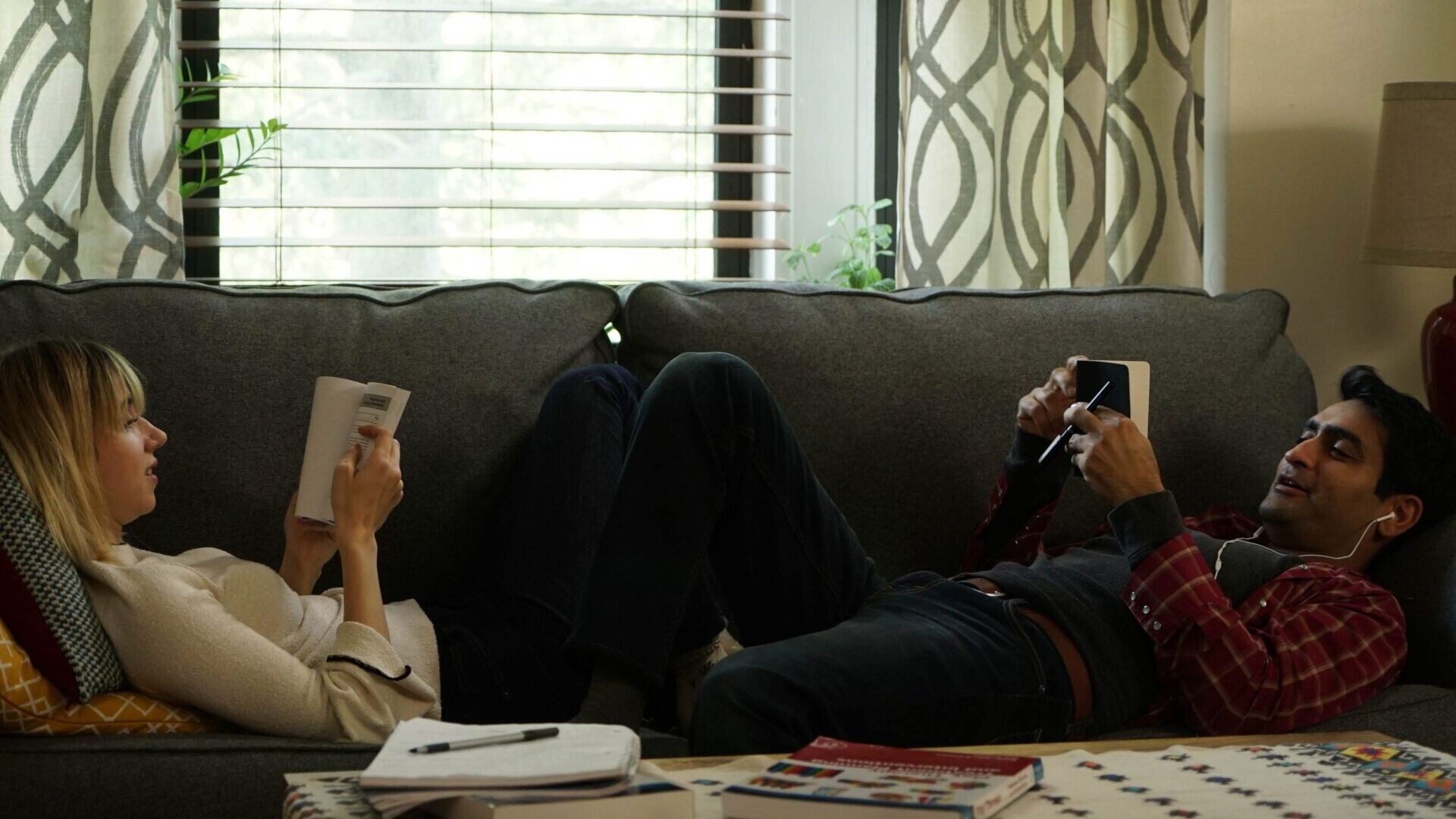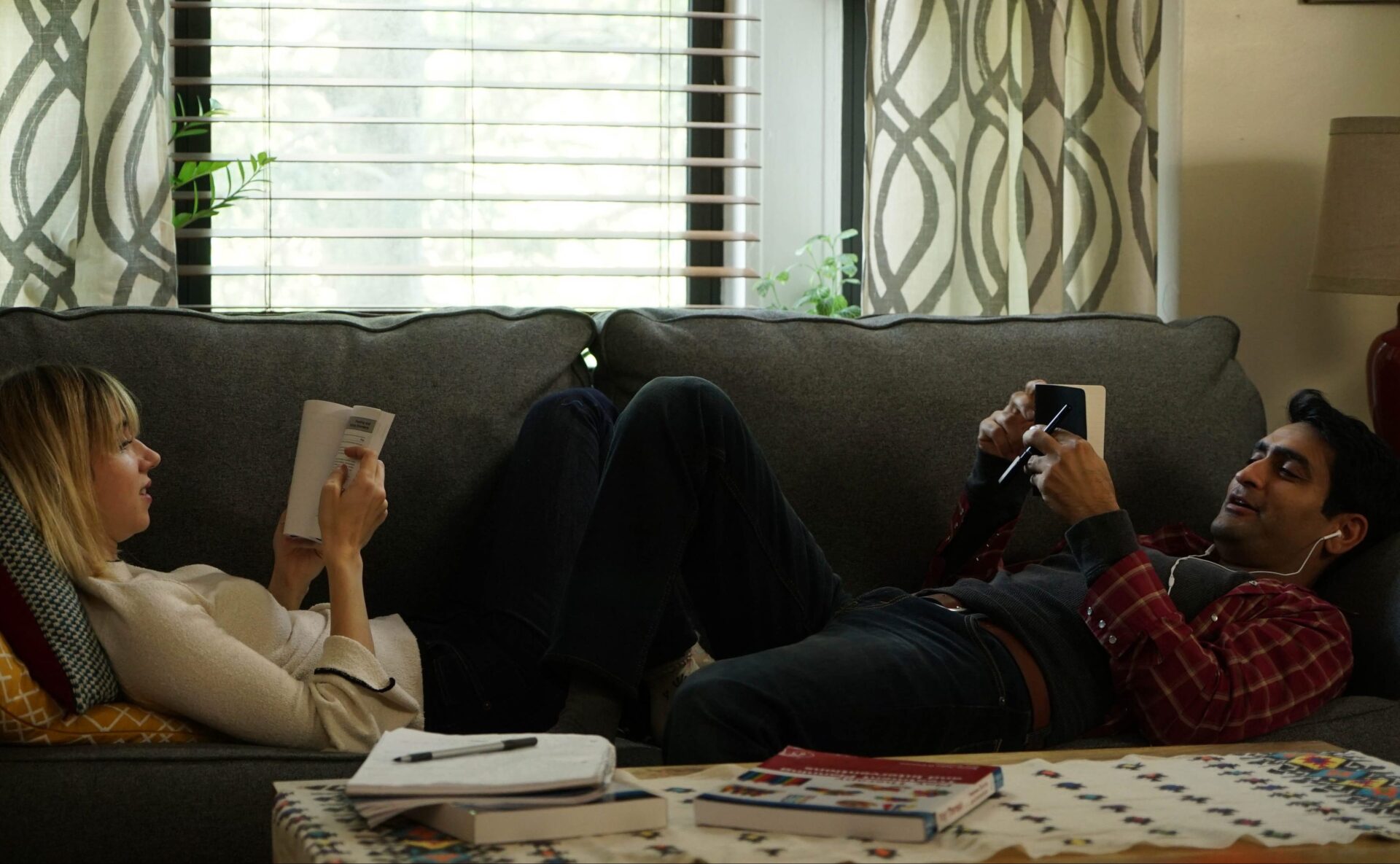This review previously ran on February 17th, 2017 as part of the Sundance Film Festival
This rom-com-dram goes down like a hot toddy, leaving you warm and giggly and rawly emotional in turns.
In one scene in The Big Sick, the lead character, Kumail, gets into an argument with his family, all Pakistani Muslim immigrants, at a diner. When things get heated he takes a moment to swivel his head around, repeatedly shouting to other customers that, “It’s okay, we hate terrorists! We hate terrorists!”
So yeah, The Big Sick is too good for this world, too pure. That phrase has become a Tumblr fallback for describing shapely cinnamon rolls and likable characters, but in the case of this kind-hearted, uproarious romantic comedy, it’s all too apt. This rom-com-dram goes down like a hot toddy, leaving you warm and giggly and rawly emotional in turns.
The Sundance hype for The Big Sick was enormous and stood at a crossroads. On the one hand, there was the usual, ol’ hype for a delightful fest crowd-pleaser discovered and bought for a hefty sum. (In this case, The Big Sick was scooped up by Amazon for $12 million and a Summer 2017 release) On the other hand, there’s the context. In this climate, the story of a Pakistani-born comedian from a Muslim family falling for a white American grad student plays with a heightened sweetness and urgency. Like so many films these days, The Big Sick will be received in a world that can feel jarringly different to the one in which it was produced.
I sat down to this film the day after the Trump Administration unleashed their malicious, chaotic, and culturally-insensitive executive order. To be more specific, because that’s tragically necessary, I refer to the immigration order blocking Syrian refugees indefinitely, drastically constraining entry from 7 Muslim-majority countries, and delaying any refugee admittance for 120 days. This may not be the forum for a deep dive into our American nightmare. It might not be the place for the fact that lightning bolts and slippery bathtubs are an infinitely greater threat to American lives than immigrant students, doctors, and artists. Still, it’s impossible to describe how precious and joyous and needed this film felt at that moment in that Sundance theater. And though it’s far from the cruelest chapter of this ban, it should be noted that the order has already fallen heavily on the arts. So, if you think film discussions should leave out current events then look no further than the team behind Iran’s Oscar-nominated The Salesman, including renowned director Asghar Farhadi. They will be unable to attend the Oscar ceremony if the ban, or something in its spirit, returns. When a filmmaker whose humane dramas have captured global audiences is unable to enter America because of the “violent ideologies” he’s suspected of holding, our every value, our every aspirational hope for America, lies gasping.
In this climate, the story of a Pakistani-born comedian from a Muslim family falling for a white American grad student plays with a heightened sweetness and urgency.
So, clearly, The Big Sick is a film America needs. It offers a universally appealing, yet insightfully specific, look at finding the person with whom you belong, in a country you are trying to belong to, despite that country’s tenuous welcome. As such, it would be easy to simply discuss the joy and necessity of seeing a brown man as the romantic lead in a commercial, American rom-com. And that is deeply wonderful. But of course, the power of the film comes not merely from its welcome focus on the Pakistani-American experience, but from the particular experiences of Kumail Nanjiani and Emily V. Gordon.
Kumail Nanjiani (“Silicon Valley”) portrays himself in the film, which is an autobiographical chronicle of his relationship with his now-wife, Emily V. Gordon (Zoe Kazan). The couple scripted the film together, and it covers their meeting, dating, breakup, and the illness that placed Emily in a coma. Much of the film takes place with Emily unconscious and Kumail getting acquainted with her stressed and fierce parents (played pitch perfect by Holly Hunter and Ray Romano), even as her chances of survival waver. Full of heaviness and light, the film has a lot of ground to cover, which explains its, unusual for a comedy, runtime of 2 hours. Despite the length and the generic elements of the film; a sudden illness, a forbidden connection, a meet the parents arc, the film never tires. It’s entirely absorbing, with a fully realized cast of characters and a lived-in world of black box theaters, homey Chicago apartments, and Pakistani parents intent on getting their son settled down with an appropriate Muslim girl.
It’s also constantly hilarious. I won’t spoil too many moments, though there are hundreds so I couldn’t make a dent if I tried. One great recurring bit involves Kumail arguing that even positive comments shouted at a comedian constitute heckling. Emily asks if her shouting “You’re great in bed!” would be unwelcome at a show. “Yes,” Kumail responds, “That would be a heckle. That would be an accurate heckle.”
I love this movie so dearly. I love it as it itself, anytime, and I love it for existing right now. I love that it gives us an intimate, open look at a love story that is both ordinary and extraordinarily eventful. I love that it has a scene where Kumail tries to test a knowing, wise-cracking Emily’s taste by insisting she watches some of his favorite B horror movies. Because when we fight for justice and equality, these images are helpful, and this normalcy is everything. To quote my favorite vampire-noir series “Angel,” because I think it expresses what I want to say, this film “lives as if the world is as it should be, to show it what it can be.”
‘The Big Sick’ is rated R for language including some sexual references. 119 minutes. Opening today at ArcLight Hollywood, The Landmark, and AMC Century City with additional cities to follow on July 14th.
Kailee Andrews
Kailee holds a Communication Arts B.A. from the University of Wisconsin. At 21, she programmed her first film festival for an audience of 4,000+ on campus. Since then, it's been all about sharing the cool arts and crafts of cinema.


